Four experts weigh in on what to do to help a loved one who just got a cancer diagnosis
By Deborah Jeanne Sergeant
If a friend or loved one receives a cancer diagnosis, it’s only natural to want to reach out in some meaningful way to show you care. Area experts provided a few ideas on what you can do to help.
• “Clean the house for the patient.
• “Try taking them somewhere special.
• “Help with animal care.
• “Take them to appointments.
• “Just listen to understand and hear what the patient would like during treatment and respect that. Support them in whatever direction they want to go on their journey, whether nutrition, spirituality, alternative health or to maintain their busy life while on treatment.”
Jennifer Pichoske, director of nursing for Hematology-Oncology Associates of CNY, East Syracuse
• “Sometimes, it’s more the everyday routine things people need help with and sometimes it is more than that. If someone has a friend or loved one who’s diagnosed, it’s sometimes the little things that make all the difference.
• “Offer to run errands or buy groceries. Just doing some shopping can be helpful. In the initial stages, they get so busy with all the appointments.
• “Run to the cleaners for them.
• “Packing lunches can be challenging when they’re so tired.
• “Sending over a prepared meal for the family helps, too. With all the busyness, sometimes it’s challenging to make a healthful meal. Send over something cooked or store bought in containers they won’t have to return. They can toss the box when it’s all done. It makes life so much easier. Many church groups do this and it’s such a nice thought.
• “Offer to babysit the other children to give the patient some time alone or do things for themselves. Many of our patients have other children who need care with all of this going on.
• “Offer to attend a medical appointment or support group appointment to offer social support. These things can be isolating. A friend there can help them process the information.
• “Emotional support goes a long way.
• “Be aware that everyone handles a cancer diagnosis differently. Be sensitive to their emotional state. We all have ways we choose to cope but that isn’t necessarily the way someone else handles stress. Understand that people talk about these things differently. That way, you’re not expecting someone to handle things a certain way. That’s the hardest point because you expect them to handle it the way you do. If you give them the room to do so, they’ll let you know. Sometimes it’s little steps and other times, it’s leaps and bounds.”
Physician Ranjna Sharma assistant professor of surgery, section chief of breast surgery, Upstate Specialty Services at Harrison Center, Upstate University Hospital
• “Have a week’s worth of nutritionally packed healthy meals frozen and ready to heat up.
• “Give a gift card for a company like Hello Fresh, which delivers healthful meals with easy prep.
• “Go grocery shopping for them and stock up their cupboards and fridge.
• “Give gift cards to grocery stores and healthy restaurants. Prepare dinner for them at their home for a week or more.”
Laurel Sterling, registered dietitian, nutritionist and educator for Carlson Laboratories
• “It definitely helped when people provided meals that were sensitive to my needs. Some brought a treat for my daughter, too.
• “People always say to ask how they can help. If people asked, it was too much of a brain overload to figure it out while I was undergoing chemotherapy. What was so helpful is if people just took action. Or said, ‘I’m here, I can stop by’ in a text.
• “I had several friends who set up a Go Fund Me site for help for my medical expenses. I used every cent for medical bills.
• “Cleaning the house or doing yard work was a huge help, and my mom came and did laundry and cleaned so when I felt well, I could go for a walk or do something that was positive for me.
• “I appreciated friends asking my daughter over to spend the weekend or on play dates or to do kid things so she could escape watching how I could feel at times.
• “One of the huge things that helped me is anytime someone told me about someone they knew who was a long-term cancer survivor.”
Wendy Jensen, breast cancer survivor, Jamesville

